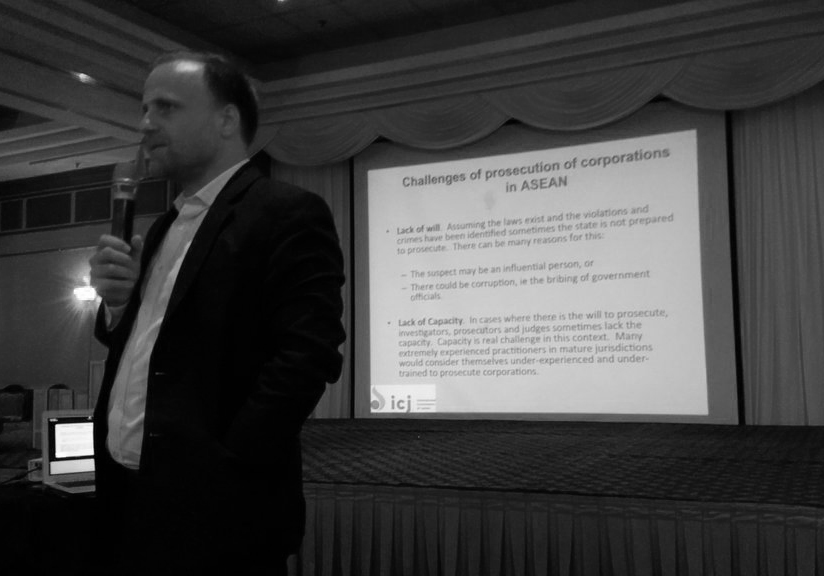The workshop, held in Yangon on 12-13 May, brought together lawyers and activists from Cambodia, Laos, Myanmar, Thailand and the Philippines to share experience and best practice on access to remedy in the area of business and human rights.
“The ASEAN Economic Community and economic growth in Southeast Asia have not occurred with corresponding improvement in human rights,” said Carlos Lopez, ICJ Senior Legal Adviser on Business and Human Rights.
“The ICJ has identified supporting the right to a remedy as a key factor in ensuring that regional economic growth does not come at the expense of rights,” he added.
The Yangon workshop was designed to promote regional networking and sharing of experiences. In particular, participants discussed how to use strategic litigation to change a culture of impunity in South East Asia.
Strategic litigation can bring about significant changes in the law, practice or public awareness via taking carefully selected cases to court.
The clients involved in strategic litigation have been victims of human rights abuses that are suffered by many other people.
But strategic litigation does not happen entirely in the courts. Successful litigation will include social mobilization, awareness-raising, and skillful use of media.
Lawyers shared case studies revealing human rights abuses committed by business enterprises, fuelled by rapid, unregulated investment.
Unresolved and endemic disputes over land in Cambodia, Laos and Myanmar have given rise to human rights abuses and even conflict.
Illegal labour practices and the plight of migrant workers highlight the legal difficulty of prosecuting companies that operate in multiple jurisdictions.
Many of the abuses discussed concern the rights of communities, often the most marginalized.
Retaliation against communities and their lawyers for opposing development projects is common.
They fear legal action, intimidation and violence as a result of asserting human rights.
The workshop made clear that ASEAN states are not fulfilling their responsibility to protect human rights and are not providing adequate remedy for abuses by corporations.
“Despite diverse legal and political systems, the challenges facing these lawyers are strikingly similar,” said Daniel Aguirre, ICJ International Legal Adviser based in Yangon. “Protective laws are unimplemented in practice, individuals and communities lack effective access to remedy and they are often persecuted for asserting their human rights.”
Aside from outlining their important cases, participants at the workshop explained the strategies employed to affect change.
They discussed social mobilization and marches in the Philippines, the promotion of local culture and the use of media in Thailand, the engagement of civil society with lawyers in Cambodia and the struggle for land rights in Myanmar and Laos.
Participants took advantage of simultaneous translation to compare approaches.
Many participants pointed to a culture of impunity, where business activities often went unregulated, and corrupt authorities failed to implement and enforce laws.
Lawyers explained the difficulty of collecting evidence when so few locals were aware of the law and their human rights.
Moreover, crimes of a transnational nature present additional challenges, as people from different languages, cultures and legal systems must cooperate to enforce laws.
Underpinning all of these problems is the lack of independent judiciaries. “The lawyers all agreed that access to remedy is undermined by partial authorities that lack independence,” said Aguirre. “Even if they manage to get to trial, the courts are not always independent, impartial and competent.”
Contact:
Daniel Aguirre, ICJ International Legal Adviser, Yangon. daniel.aguirre(a)icj.org
Carlos Lopez, ICJ Senior Legal Adviser on Business and Human Rights, Geneva. carlos.lopez(a)icj.org




